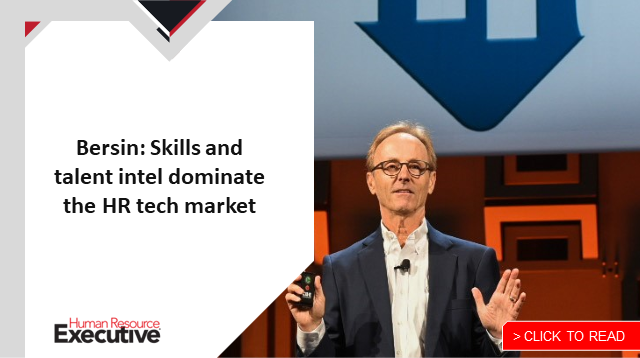The healthcare industry is reeling from the one-two punch of a severe nursing shortage and too few younger people pursuing careers in healthcare. In response, HR leaders at leading healthcare facilities—like those in many industries—are transforming their organizations to not only retain experienced nurses but also to find new talent to fill open roles.
In new research, HR technology analyst and HRE columnist Josh Bersin found that healthcare organizations need to adopt talent intelligence solutions, which create a “system of record” for housing data on the skills that employees inside an organization possess currently and the skills they will need to grow their careers.
These solutions, which require tremendous amounts of data from multiple sources, create a newer level of HR technology within organizations that is dynamic, requiring HR leaders to know and understand the skills required by their competitors and by other industries.
In addition, medical employers must master their own skill taxonomies and classify what specific medical skills are rising and falling in importance, Bersin said in his recent webinar “First look: Exclusive industry insights from Josh Bersin’s Global Workforce Intelligence Project.”
For example, Eightfold, the webinar’s sponsor, has gathered skills and people data from more than 1.5 million jobs in multiple job sectors to analyze data for HR leaders looking to improve their talent operations, he said.
 “What are the best skills for the registered nurse? Knowing this can help hire and retain RNs and other classes of nurses,” said Bersin.
“What are the best skills for the registered nurse? Knowing this can help hire and retain RNs and other classes of nurses,” said Bersin.
Healthcare has changed thanks to the demands placed on frontline medical workers who have experienced burnout and staff shortages since the start of the pandemic. And reinforcements are not on the way for a variety of reasons: New nurses who enter the healthcare field will leave after two years, and to make matters worse, every hour two nurses will be assaulted by patients.
“By 2025, there will be a gap of 2.1 million open nursing roles,” said Kathi Enderes, senior vice president of research for The Josh Bersin Company.
This is not sustainable for healthcare, Enderes said. Although reskilling has become popular in the industry thanks to advancements in medical technology, medical employers need to bring new people into healthcare, she said.
“They deal with life and death every day and many are burned out. They are switching their roles and getting new jobs in retail, consulting and telecom for telemedicine,” she added.
In fact, retail industries have had an impact on healthcare and the people who practice it.
“People can get some of their healthcare from retail settings and the retail aspect of healthcare makes it more scalable,” said Bersin. These retail settings include pharmacies like CVS and Walgreens and big box stores such as Costco, which all offer vaccinations, basic medical tests and more.
Some hospitals have turned to using robots to dispense medications and hiring people with high school diplomas to perform such tasks as providing printouts of medical documents to patients leaving the emergency room. Some healthcare organizations are even going into workplaces facing wide-scale automation, like Amazon distribution centers, to promote the rewards of studying nursing.
And healthcare providers are upping the benefits to their nursing staff and new recruits. Houston Methodist provides on-demand pay, United Healthcare offers remote nursing positions, Bon Secours Mercy Health delivers tuition-free career paths, and New York Presbyterian offers on-site child care. 
Healthcare organizations must acknowledge that not only has healthcare changed but so have the role of HR in addressing current nursing challenges and even the nature of the workforce, according to Bersin.
“We have tried to get away from academic and tenure-based hiring and companies have moved to career skills-based hiring,” he said. “This means that today’s workers can move across industries at rates we have never seen before.”
The post Many workers are still burned out and quitting. How talent intelligence can help retention appeared first on HR Executive.